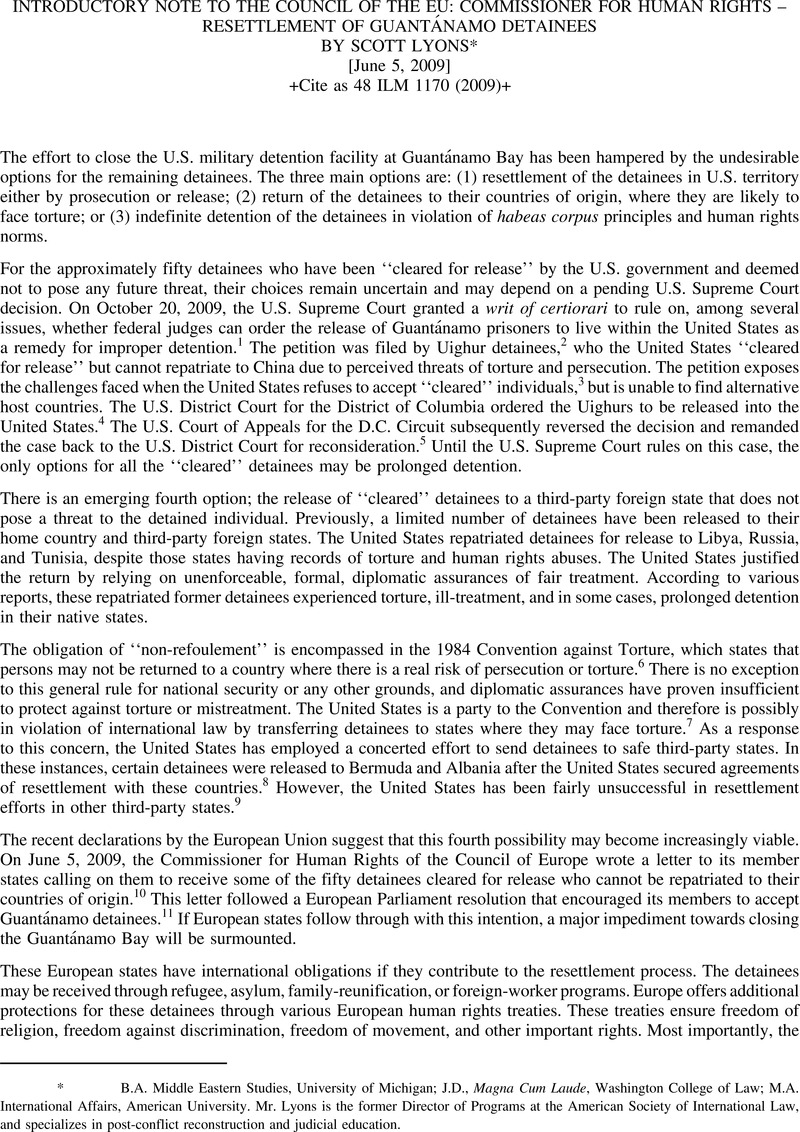No CrossRef data available.
Article contents
The Council of the EU: Commissioner for Human Rights – Resettlement of Guantánamo Detainees
Published online by Cambridge University Press: 27 February 2017
Abstract

- Type
- International Legal Materials
- Information
- Copyright
- Copyright © American Society of International Law 2009
References
* This text was reproduced and reformatted from the text available at Council of Europe website (visited November 20, 2009) <https://wcd.coe.int/com.instranet.InstraServlet?Index=no&command=com.instranet.CmdBlobGet&InstranetImage=1251277&Sec-Mode=1&DocId=1412916&Usage=2=.
1 In re Guantanamo Bay Detainee Litig., 581 F. Supp. 2d 33 (D.D.C., 2008), rev’d and remanded sub nom. Kiyemba v. Obama, 555 F.3d 1022 (D.C. Cir. 2009), cert. granted, 2009 U.S. LEXIS 7566 (U.S. Oct. 20, 2009), (No. 08-1234).
2 Uighurs are an ethnic Muslim minority population with a history of discrimination and persecution by the Han Chinese government. The Uighurs in question fled China and resettled in Afghanistan before moving to Pakistan to escape the start of the 2002 war. The Uighurs were subsequently arrested by Pakistani border authorities and transferred to the U.S. military. The Uighurs native region of China, the Xinjiang Uighur autonomous region, has suffered from ethnic clashes and riots in 2008 and 2009 resulting from longtime claims of political, cultural and religious persecution of the Uighurs. The Chinese government has branded the Uighurs terrorists.
3 To this point, both the Executive Branch and Congress have refused to allow these individuals to enter the United States. Congress enacted restrictions on the use of funds for Guantá-namo prisoners, including a ban on transferring any detainee to live in the United States as a free individual.
4 581 F. Supp. 2d 33.
5 Kiyemba v. Obama, 555 F.3d 1022 (D.C. Cir. 2009). The court held that ‘‘a nation-state has the inherent right to exclude or admit foreigners and to prescribe applicable terms and conditions for their exclusion or admission.’’ Id. at 1025. Further, the court held that the political branches have ‘‘the exclusive power . . . to decide which aliens may, and which aliens may not, enter the United States, and on what terms.’’ Id. In a separate decision, the U.S. Court of Appeals for the D.C. Circuit held that federal courts lack the authority to prevent the transfer of Uighur detainees to any country where they are likely to be subjected to further detention or to torture. See Kiyemba, 561 F.3d 509.
6 Convention against Torture and Other Cruel, Inhuman or Degrading Treatment or Punishment art. 3, Dec. 10, 1984, 1465 U.N.T.S. 85, 23 I.L.M. 1027,
-
1.
1. No State Party shall expel, return (‘‘refouler’’) or extradite a person to another State where there are substantial grounds for believing that he would be in danger of being subjected to torture.
-
2.
2. For the purpose of determining whether there are such grounds, the competent authorities shall take into account all relevant considerations including, where applicable, the existence in the State concerned of a consistent pattern of gross, flagrant or mass violations of human rights.
7 When giving its advice and consent to the convention, the United States Senate included an understanding of the threshold for determining the threat of torture that may make it easier to return a detainee without violating international law. Further, the government has argued that its non-refoulement obligations do not apply to Guantánamo Bay.
8 Bermuda accepted four Uighurs in June 2009. Albania accepted five Uighurs in 2006. Palau has also offered to accept the remaining Uighur detainees.
9 The United States has unsuccessfully contacted close to one hundred governments for resettlement purposes.
10 Letter, Commissioner for Human Rights of the Council of Europe (June 5, 2009), available at https://wcd.coe.int/com.instranet.InstraServlet?Index=no&command=com.instranet.CmdBlobGet&InstranetImage=1251277&SecMode=1&DocId=1412916&Usage=2.
11 Resolution on the Return and Resettlement of the Guantánamo Detention Facility Inmates European, Eur. Parl. Doc. P6_TA (2009)0045 (2009), available at http://www.europarl.europa.eu/sides/getDoc.do?pubRef=-//EP//TEXT+TA+P6-TA-2009-0045+0+DOC+XML+V0//EN.


